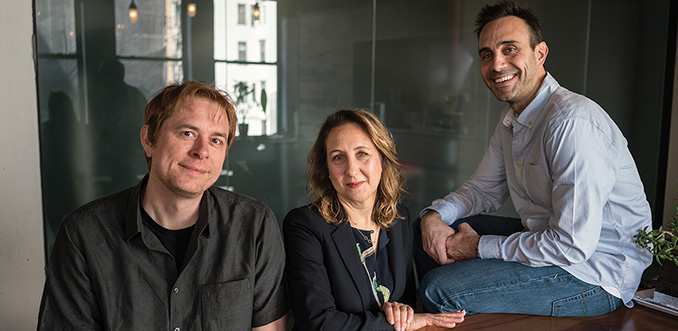by Steve Hullfish • portraits by Sarah Shatz
Acclaimed writer-producer David Simon’s production company has delivered multiple hit series for cable television, most recently for HBO. During that time, he has built a team of picture editors who have been working together for over a decade. Alex Hall, Kate Sanford, ACE, and Matthew Booras have had the rare opportunity to work together for many years, starting with HBO’s heralded The Wire (2002-2008) and Treme (2010-2013). This team’s latest collaboration for Simon is HBO’s The Deuce (2017), which premieres its eight-episode run September 10.
The Deuce chronicles the changing world of 1970s-era Times Square pornography and prostitution. The series stars James Franco, playing twins who run a burgeoning sex business for the mob, and Maggie Gyllenhaal as a prostitute with bigger ambitions. Franco is also one of six executive producers (including Simon) on the series, and directs two episodes.
Hall is a veteran of numerous films and TV series including The Wire, Blue Bloods (2010-present), True Detective (2014-present) and Treme. Sanford’s pedigree consists of multiple HBO series, including Vinyl (2016), Boardwalk Empire (2010-2014), The Wire, Treme and Sex and the City (1998-2004). And Booras is in the editor’s chair for the first time after assisting on The Wire, Treme and 30 Rock (2006-2013). CineMontage interviewed the trio in March.
CineMontage: How did this team come to work on The Deuce?
Alex Hall: Executive producers David Simon and Nina Noble are nothing if not loyal to and supportive of their past collaborators and their extended creative family. Kate, Matthew and I are among the longest “tenured” members of that family, so they reached out to us as soon as The Deuce looked like it might actually happen. We all were more than happy to “get the band back together,” especially on such an intriguing and challenging new project.
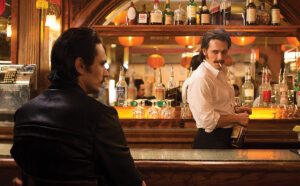
The Deuce Pilot HBO
Personally, working with Kate has always been one of the highlights of my career. When I started on The Wire, I remember wanting desperately for my work to be just good enough to live up to the standard she had set for the show. I’m not sure she knows this, but I studied her episodes and her other work and tried to emulate the elegance and intelligence of her cutting. And, when we were working together, I just tried to learn as much as I could from her, while pretending to know what I was doing…
With Matthew, it’s been a joy to watch him grow and blossom as an editor. After we had finished the pilot, and The Deuce had been picked up to go to series, Nina and I had a conversation and she told me she wanted to extend an offer to Matthew as a full-time editor. I just laughed with relief because I had been waiting for the chance to talk to her to make the same suggestion! It just felt right. And Matthew totally made the most of the opportunity. In this mercenary business, for the three of us to have the kind of close creative collaboration that we have had over such a long period of time is kind of amazing. It’s a blessing.
CM: Did you have a standard rotation of episodes?
AH: Usually on a season of television, you get into a real rhythm. But because we had done the pilot and then came back for the series, it was a little different. I edited the pilot, which became the first episode, and also the second episode and the finale.
The rotation got a little crazy because I also directed an episode of the show, so I wasn’t around in the cutting room as much as I would have liked.
Kate Sanford: I edited Episodes Three, Five and Seven, which would be a standard rotation with two editors alternating.
Matthew Booras: Then I edited Episodes Four — which was the one Alex directed — and Six; plus I got the opportunity to cut the main title sequence.
CM: As an editor, what is it like to work as a director with another editor?
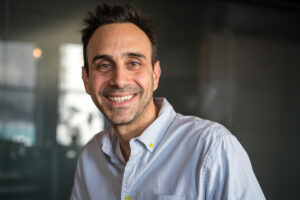
Matthew Booras.
AH: Matthew and I had been working together forever and it felt like a good opportunity for him to start editing on the one I was directing. That way, I could be involved from a directorial standpoint, but also as an editor helping him start to take that full-time responsibility. As an editor, I’m so used to having my fingers on the keyboard, so it was a little frustrating at times to sit on the couch.
MB: We often discussed Alex’s experiences on set, because as an editor, you never really hear about that.
AH: The edit room becomes a confessional in a lot of ways; it’s a safe space. I always tell directors I work with that they’re allowed to vent and speak freely, and that nothing will leave that room. So, when you get two people who have been collaborating for a long time, and you’re on this new project with new dynamics and new politics, let’s just say there was a lot of confessing.
KS: All of us had a great advantage starting The Deuce because we knew what kind of world and what type of approach David tends to start with. In every project, there are going to be stylistic variations, but in terms of launching a series, we all had a similar starting point — which is basically tight, straightforward storytelling without being self-consciously stylized. Music is always used in a diegetic way, except for montages, which are scripted.
CM: James Franco directed two episodes of this series, and Kate, you cut those episodes, right?
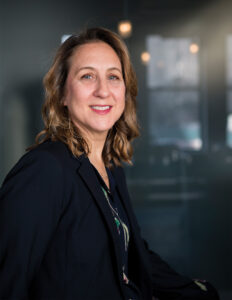
Kate Sanford.
KS: Yes. In our first meeting he asked me, “What should I be thinking about? What should I be doing in terms of style?” I explained the type of world-building that we had done in The Wire and Treme. I feel like the world that we’re usually working with is based on straight cuts from scene to scene with simpler visual transitions. He appreciated that, so we were able to build some trust there.
Because he’s an experienced feature director, but not as much in the TV medium, it was really important for me to communicate that everything we talked about was going to stay in the editing room. It’s pretty amazing to watch him work because he’s not only acting, he’s acting as twins. He’s playing two roles and directing. He is the greatest multi-tasker in the world.
CM: How did he deal with his own performance? How did that affect your decisions?
KS: In terms of his performance, I try to approach it just like I would any other performance. I made my choices based on how I felt the performance would fit into the piece overall and how it worked in each scene. My editorial choices were based on what I felt was most grounded and most truthful. I would present him with the performance I felt made sense, and then we would discuss it. Occasionally, he would push back and say, “I love that take where I’m laughing a lot,” or “I love that take where I’m doing a little bit more.” I think his taste tended to be a little broader than mine. We met somewhere in the middle and then the producers came in and had the final assessment.
James was playing twins so there were definitely differences between his two characters, and we had to make sure we addressed those distinctions so the audience would feel the difference between the two. He was pushing to be a little more playful, but I would just say, “I think Vincent’s a better Vincent in this performance,” or “Frankie is a better Frankie in this performance,” and he was respectful of that. I think we had a really good working relationship. He was very open to suggestion and reason, and was very professional.

Matthew Booras, Kate Sanford, Alex Hall.
CM: Matt, what was it like editing an episode for a director you’d worked for as an assistant?
MB: I took it as a compliment that he wasn’t jumping into the chair every minute! We’ve known each other for years and I can be critical without offending him on some shot that maybe wasn’t working. Generally, we had similar tastes. I owe a lot to Kate too. She’s been a champion of mine from the beginning.
CM: What do you think led to you being bumped up?
MB: I remember being down in Baltimore during my first season on The Wire, where I got more face time with the producers and other crew. Early on, I saw Anthony Hemingway get his first opportunity to direct; he was the AD on the previous seasons. Christine Moore, who was the script supervisor, got to direct. So, I knew there was a nice loyalty rewards program going on. When it’s an HBO show and is being executive produced by David Simon, Nina Noble and George Pelecanos — just being in that world of high-quality Sunday night HBO — I knew there would be opportunities somewhere down the line. I was anxious to start cutting a few years back, but I knew that if I just stuck with it and tried to do my best, it would pay off in the end.
CM: What was it about Matthew that led you two to feel he could move up?
KS: I think he’s just incredibly calm, patient and a steady source of support. You have to become familiar with the producers, know that you’re going to do everything to support them and understand politically how the group works. David likes you to present a point and loves to argue and debate. You have to know when to push and when to take a step back and let it stand. And then, if you really feel strongly, you need to know when to come back in diplomatically and say, “Can we take another look at this?”
AH: Treme was ambitious and things can get hectic. It was almost impossible sometimes to finish those episodes on schedule, editorially. Having Matthew, who could step in and pick up scenes on the side and keep the train moving, was such a luxury. So, I don’t think anyone had any doubts after going through that for several seasons that Matthew was ready to take on his own episodes.
CM: What are some of the difficulties of the straightforward editorial style of this whole line of shows from this production team?
AH: The language of David’s work has evolved to a degree from The Wire. From a production standpoint, Treme was somewhat more ambitious cinematically and we pushed it a little bit to make it more cinematic, more sensual and kinetic. On The Deuce, we all felt that because of the period and the ambitions of the show, it had the potential to be more cinematic than anything we had worked on previously with this group of producers and writers. But we knew that a lot of the old rules would still apply.
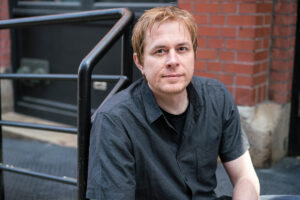
Alex Hall.
KS: I agree. There has definitely been an expansion of the language. I worked on another project with David before The Deuce: the miniseries Show Me a Hero [2015]. That was unique to his productions because we used some subtle score to connect sequences and create unity among a more disparate collection of scenes and characters. There were more cinematic elements, but I still felt I had to be quite careful about executing those things so that I didn’t create what David might feel is a sort of manipulation.
In every scene and every beat, I’m trying to get as much emotion, feeling and meaning as I possibly can. But we don’t want to foreground any of the technique or production. We always want to privilege the writing and highlight the characters. So, things like dissolving from one scene to another or having too many establishing shots or pre-lapping dialogue from one scene to the next to ease the transition — I still feel like we need to do those things sparingly.
The other challenge with these pieces, because they’re so densely written, is to fit them into an hour or an “HBO hour,” which is 58 and a half minutes. Sometimes you have to make some scenes play tighter to make room for other scenes that can then be expanded. I had a dance scene in episode five that took up two or three minutes of screen time. I had to make room for that by making other things a little bit tighter.
CM: Why is the use of these common techniques to transition between scenes frowned upon?
AH: I think the trick is to not draw attention to anything in the edit as far as the cuts or sound goes. It’s a very understated, un-self-conscious approach. This is a general aesthetic that applies across most of Simon’s productions.
CM: So jump cuts are out?
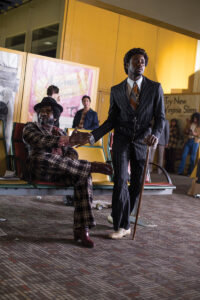
The Deuce Pilot HBO
AH: Funny you should ask! There is a scene in the episode of The Deuce that I directed in which Maggie Gyllenhaal [Eileen] is going through her wardrobe and getting dressed for a date. It was a nicely orchestrated and elegantly shot scene. We got the point pretty quickly and the scene was hovering around 45 seconds with no dialogue, so we toyed around with jump cuts that ended up saving us probably 15 seconds.
MB: We talked about it in the edit when we were doing it. You said not to do it because the producers would never go for it.
AH: I said to keep it in your back pocket. When we shot it, we intentionally crafted the shots to accommodate that, so if it needed to happen later it could.
KS: I think there’s also a difference between using jump cuts as an elegant solution to an editing problem, as opposed to making jump cuts to emphasize the style and have some fun with the edit — like a Breaking Bad montage.
CM: How do you split your allegiances between the directors and the producers?
KS: We need to be as supportive as possible of the directors in service of their work. Even if I know a shot isn’t going to make it past the producers, I really want to collaborate with the director as much as possible. I would rather present the producers with something that draws out the director’s absolute best work — even if we’re bound to have to put a different sort of polish on it later and re-orient it back into the David Simon aesthetic of the particular show we’re on. Alex, Matthew and I are the style-bearers on this series.
We’re the people who know a little bit more about the show and we help the directors along. We work with them during the shoot and then for a five-day director’s cut. We then say goodbye to them to start working with the producers. We have to have serialized loyalty: Director first, producers later.
AH: We try to protect the directors by not putting something in front of the producers that is going to make them feel like this director just doesn’t get it. I’ve seen it from both sides now as a director on these shows. As a TV director, you’re really just giving the producers the pieces they need to make their show. You may want to put your own spin on it, but if you set out to redefine the language of a show, you’re not going to get hired back.
So we walk a fine line as editors in television to try to give the directors what they want — because obviously that’s our job when they’re in the room with us — but also to not expose them to an unflattering judgment by the producers. Kate, Matthew and I all have feet in both the TV world and the film world. We’ve all worked on movies and television, and it is a really different dynamic. With a feature, the director is the author, whereas television is a producer’s medium, as the saying goes. So we tend to defer to that.
CM: Finally, what’s the value to having an editorial staff that has spent so much time together?
KS: It’s fantastic to work with long-standing collaborators and friends because there is so much trust and respect. We can watch each other’s scenes and episodes and comment without fear of judgment; we come at it from a place of total trust and support, not ego. It’s a great pleasure to work with your friends.


